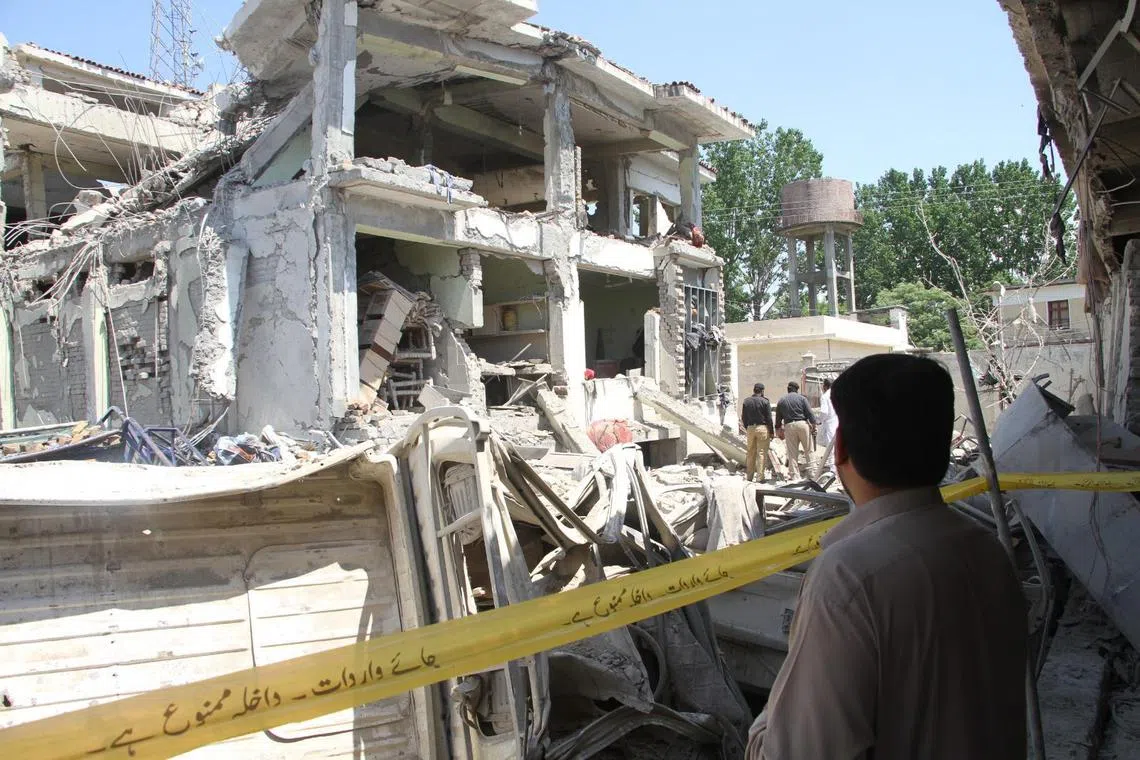At least 15 killed, dozens hurt as blasts damage Pakistan police station
Sign up now: Get insights on Asia's fast-moving developments

Security officials inspect the scene a day after two blasts rocked a counterterrorism office in the Swat Valley in Pakistan on Monday.
PHOTO: EPA-EFE
ISLAMABAD – Two explosions at a compound for counterterrorism police in northern Pakistan killed at least 15 people and wounded dozens late on Monday, police officials said, after months of increased terrorist attacks
Pakistani Taliban militants have repeatedly targeted the police, particularly counterterrorism department officials, in recent months. And the area where the attack took place, the Swat Valley of Khyber-Pakhtunkhwa province, has seen a notable increase in militant activity.
But some investigators insisted there was no evidence that the deadly blasts – which also wounded at least 57 people, according to local officials – were caused by an attack. Police officials said the detonation occurred in the basement of the police compound, where mortar shells and other weapons and munitions captured from militants had been stored, and that an electric short circuit or some spontaneous detonation may have caused the explosions.
Mr Nasir Mehmood Satti, a deputy inspector-general of police, said initial investigations pointed to “carelessness”.
The first powerful explosion forced the roof of the compound’s main structure to cave in and damaged a nearby mosque and a few houses in the town, Kabal. Several police officials were trapped under the rubble of the police station and were pulled out, officials said.
According to police officials, the building had been in a decrepit state and most of its personnel and equipment had recently been relocated.
The wounded were moved to different hospitals in Swat, local health officials said. The Health Department of Khyber-Pakhtunkhwa declared a health emergency in Swat and placed all hospitals on red alert.
Since the Afghan Taliban’s takeover of neighbouring Afghanistan in 2021, the Pakistani Taliban – Tehreek-e-Taliban Pakistan, also known as the TTP – has staged a comeback in several parts of Pakistan and waged an increasingly intense campaign against security forces.
Mr Murad Saeed, a former member of Parliament who is affiliated with former prime minister Imran Khan’s Pakistan Tehreek-e-Insaf party, insisted that the explosion had to have been a terrorist attack.
“The attack is similar to the one that targeted police in Peshawar,” Mr Saeed said in a video message, referring to the suicide bombing in the provincial capital of Khyber-Pakhtunkhwa in January that killed more than 100 people.
A group of activists in Swat also rejected the police force’s claims, calling the explosion an act of terrorism and declaring that they would organise a protest in the valley on Tuesday.
“Today’s protest will show that Swat’s people are peace-loving people and will not allow any elements, whether it is the Taliban or the state, to sabotage the hard-earned peace any more,” said Mr Zaman Shah, 32, a resident of Kabal.
Swat, a picturesque northern valley, has long carried scars from terrorism, and from the resulting military campaigns to stamp it out.
Swat had been a popular tourist destination before it fell into the hands of the Taliban in late 2007. The militants imposed their harsh version of Islam on the local population, killed community leaders, blew up girls’ schools, and forced men to grow beards and attend prayers – at times flogging and even beheading accused wrongdoers in public.
In 2009, the Pakistani military launched a massive military offensive against the militants in Swat and successfully wrested control of the territory from them after months of fighting.
Swat is also home to Nobel winner Malala Yousafzai, an activist for girls’ education in the region
In August 2022, groups of armed militants were reported to be reappearing in some parts of Swat, reigniting fears among residents of the region. The military stressed that the reports of Taliban resurgence in the valley were exaggerated, but concerns were already rising even before the deadly blasts this week. NYTIMES


